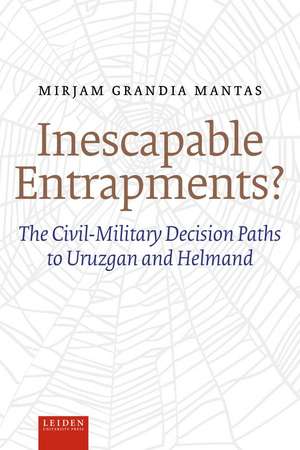Inescapable Entrapments?: The Civil-Military Decision Paths to Uruzgan and Helmand
Autor Mirjam Grandia Mantasen Limba Engleză Paperback – 3 mar 2021
Inescapable Entrapments? reevaluates the role of the military in foreign policy by comparing the decision-making processes behind British and Dutch military action in Afghanistan. Drawing on more than one hundred interviews, this study finds that neither the military nor the government influenced the other to act; rather, the decision to deploy troops to Afghanistan emerged organically from a series of prior transnational commitments.
Preț: 382.57 lei
Preț vechi: 469.34 lei
-18% Nou
Puncte Express: 574
Preț estimativ în valută:
73.26€ • 74.76$ • 61.64£
73.26€ • 74.76$ • 61.64£
Carte indisponibilă temporar
Doresc să fiu notificat când acest titlu va fi disponibil:
Se trimite...
Preluare comenzi: 021 569.72.76
Specificații
ISBN-13: 9789087283643
ISBN-10: 9087283644
Pagini: 294
Ilustrații: 2 halftones, 2 tables
Dimensiuni: 159 x 235 x 18 mm
Greutate: 0.42 kg
Editura: Leiden University Press
Colecția Leiden University Press
ISBN-10: 9087283644
Pagini: 294
Ilustrații: 2 halftones, 2 tables
Dimensiuni: 159 x 235 x 18 mm
Greutate: 0.42 kg
Editura: Leiden University Press
Colecția Leiden University Press
Notă biografică
Lt. Col. Mirjam Grandia Mantas is assistant professor of international security studies at the Netherlands Defence Academy.
Recenzii
“The book offers a fresh and illuminating interpretation of how, by whom, and when decisions were made in the Netherlands and United Kingdom as they sought to take part in the NATO operation in Afghanistan. The analysis is original and shows convincingly that the practice had little relationship to the theory upon which political and military processes for the use of armed force are structured.”
“In this book, Mantas proposes a radical and subversive thesis. She shows that the Dutch and British decision to deploy to the NATO mission in southern Afghanistan in 2006 was not made independently by the respective governments of these countries, as might be expected. Rather, both countries were mutually committed to the operation by their transnational military interconnections and obligations. The book represents a major contribution not just to understanding NATO's campaign in Afghanistan but strategy in the twenty-first century.”
